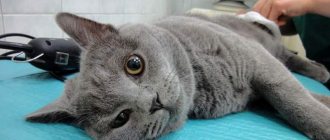Most owners, as soon as a cute fluffy dog appears in the house, think about the fact that in the near future he will need to be neutered. This happens if the cat is not taken for breeding and producing offspring. By the way, this is why most owners give preference to males. But sometimes they also create a lot of problems in keeping them, including marking around the house, running out the window, and calling females at night. Castration is a proven and reliable way to solve such problems. However, there are exceptions to this rule. Sometimes after the operation the male behaves as if it never happened and shows signs of sexual heat. Why might this happen? Who is guilty?
Why does a cat want a cat after castration - behavioral characteristics before and after
An emasculated cat is quite capable of mating. This is not difficult to understand - the castrato tries to mount the cat, if there is one, and makes movements similar to sexual intercourse with a soft toy and with any soft object. Especially if he already had such experience. The owner, unknowingly, begins to blame the veterinarian who operated and find out whether a neutered cat can mate with a cat.
Cat, mating
Sometimes the reason is the method of castration or sterilization. Experts use the following options:
- orchiectomy, or cutting out the testes;
- vasoresection (ligation of the spermatic cords);
- vasectomy (cutting the spermatic cord).
In the last two (if only sterilized) testosterone production does not stop. The desire to mate does not disappear. The cat performs full sexual intercourse, but without fertilization.
In the first case, the production of sex hormones is excluded. The cat ceases to be a male and loses interest in cats. Strong-smelling marks, nightly screams, and property damage are a thing of the past.
Need to know ! Castration reduces the risk of malignant tumors in the genitourinary area.
It would be wrong to expect changes in the cat's behavior. In ordinary life, he remains the same as he was before castration. The degree of activity and mobility will not decrease. The changes will affect only the sexual sphere. But you will have to completely reconsider the feeding scheme and diet. Now the cat does not need to spend calories on the production of seminal fluid, on active searching, courtship and sexual intercourse. Fights with rivals are also excluded. By the way, reductions in physical activity can be compensated for by additional walks and active games.
There are no problems with untied cats. After castration, all signs of sexual desire immediately disappear. They will no longer ask for the cat or mark.
The operation was performed by an unscrupulous doctor
The desire for sexual intercourse and conception can occur with incomplete castration. In 2% of cats, cryptorchidism is observed, that is, one or both testicles remain inside the pelvic cavity and do not descend into the scrotum. The testis can even be located in the thigh area, at the base of the penis, between the anus and the penis. In this situation, an inexperienced or unscrupulous doctor can cut out only what is in the scrotum, and the rest, which is fully functional, will perform its function.
Need to know ! Cryptorchidism is a pathology. It can be eliminated even without planning castration. The negative side of the phenomenon is that an undescended testis can degenerate into seminoma, that is, a cancerous tumor.
To avoid mistakes, before going to the veterinarian for surgery, the owner is recommended to personally palpate the cat’s scrotum. Two beans should be palpable.
Castration for cryptorchidism
The bad consequences of castration may also have another reason, for example, early emasculation. Intervention in the kitten's genitourinary system can lead to underdevelopment of the urethra, which will lead to inflammatory processes. A young animal is prone to catching a cold. There is also a danger of early castration - this is incomplete removal of the testis. The remaining part will produce a certain amount of sex hormones. The cat will be almost a full-fledged male.
Based on these reasons, experts recommend castrating the animal no earlier than six months. It is even better to wait until 7-9 months of age, or at least wait until both testicles descend into the scrotum.
Interesting ! There is no point in waiting for the testes to drop in a calico kitten. Only a cat can be tri-colored.
Typically, cryptorchid cats can be operated on only a year after birth or later. Therefore, it makes sense to wait for the testes to descend naturally. Otherwise, you will have to undergo abdominal surgery with removal of the undescended testicle and external surgery from the scrotum. In the future, such cats are no different from healthy ones.
Need to know ! Before the operation, it is necessary to donate blood and urine for analysis.
Cat examination
It wouldn't hurt to have a full examination by a specialist. Symptoms of cardiovascular and liver failure often lead to sad consequences. Complicating recovery from anesthesia. If such problems exist, examination and treatment should be carried out.
The operation can also lead to adverse consequences in the development of the body as a whole. Internal organs are formed with the participation of hormones, including sex hormones. Their exclusion can lead to chronic diseases, such as urolithiasis.
Important ! The operated animal should be taken away from the clinic only after complete recovery from anesthesia.
Little time has passed since castration
The ability of the adrenal glands to intensively produce male sex hormones (androgens) is also important. After removal of the testes, their concentration remains for some time. A cat can still impregnate a cat.
Temperamental cats with a strong sexual constitution may strive for sex even years after surgery. This is due to the production of sex hormones by the pituitary gland. Such hyperactivity should be leveled out with hormonal agents. The specialist will conduct the necessary examination and prescribe treatment.
Castration
The cat has already had contact with cats
An adult cat that has had sexual experience can continue to copulate at the level of instinct. A cat in estrus will still be attractive to a neuter. If 1-2 weeks have not passed after the operation, then intercourse may have consequences. The remaining viable sperm in the body are capable of fertilization. After this period, the process is pure physiology and does not need adjustment. This habit can last for months, years or a lifetime.
We must remember! For a cat, copulation with a castrato can result in a false pregnancy, which is not very good.
Why do you need to castrate your Scottish cat?
The advantages of castrating a Scottish cat for owners and others are obvious:
- the cat becomes calm (he will have no desire to look for a female and engage in “fighting for territory” with other males);
- the pet will pay more attention to the condition of the coat and cleanliness;
- the unpleasant odor from the cat’s body will disappear;
- he will not mark territory or damage property;
- the animal will stop screaming and meowing all year round and, in general, somehow suffer without the opposite sex.
In addition to eliminating unpleasant consequences for pet owners, castration reduces the potential risk of diseases characteristic of Scottish cats. The list includes testicular tumors, prostatitis and urolithiasis.
There is an alternative method for the Scottish breed, when radical removal of the testes is not performed. This is called a bilateral vasectomy. At the moment, it is practically not used in clinics. The cat's vas deferens are ligated, and he is deprived of the opportunity to reproduce, but the functions of the testicles remain at the same level. Unfortunately, this is not effective in solving problems with foul odor and hyperactivity in the animal.
Is a cat able to mate with a female after castration?
A castrated cat marks - the main reasons and how to stop it
Whether a cat can want a cat after castration depends on certain circumstances. Often, a neutered cat remains capable of satisfying a female even after surgery. Catteries keep such individuals specifically to calm cats in heat if they do not want to produce offspring. Sexual intercourse will be complete and will satisfy the natural needs of the cat. Pregnancy will not occur with such a relationship.
Neutered cat and female cat
How to prepare a cat for surgery
The key to successful sterilization is not only the quality of the procedure itself and proper care after the operation, but also the proper preparation of the cat for this event.
Preoperative actions are:
- Vaccination against infectious diseases. Vaccinations must be given no later than 4 weeks before sterilization, otherwise the immune system will still be weakened and the body may not be able to withstand the additional stress of surgery. If vaccination is not carried out at all, then the animal runs the risk of catching any infection that may occur in a veterinary clinic where sick, weakened animals are brought. Therefore, if you are planning to sterilize your pet, be sure to get vaccinated a month before the planned event.
- Purchasing a special blanket (bandage) that the cat will wear for 14-20 days after surgery (remember that this may not be required - in veterinary clinics, the blanket is usually put on independently). Before purchasing, it is advisable to test how well the bandage fits, whether it fits tightly to the animal’s body, and whether it is comfortable for the cat to move in it. All threads must be removed, and the edges and ribbons must be hemmed - this is a necessary measure to ensure that the cat does not swallow the threads or choke on them.
- Carrying out anti-flea treatment (especially if the female has access to the street or communicates with other animals): 1-2 days before the operation, you need to bathe the animal with medicated flea shampoo or carry out preventive treatment with special means.
- Carrying out antihelminthic therapy - in the postoperative period, the cat’s body will be very weakened, and if antihelminthic measures are not carried out in time, the cat’s intestines can become a breeding ground for a large number of these parasites. To avoid this situation, all cats are recommended to be given deworming tablets 5-7 days before sterilization - this will help rid the body of an additional source of infection that can be caused by helminths.
- Nail trimming. It is usually carried out 1-2 days before sterilization. This is not a mandatory, but recommended procedure - a cat in a veterinary clinic may become nervous and aggressive before being given general anesthesia. To prevent a restless animal from harming doctors, the owner and itself, it is recommended that its claws be trimmed before surgery.
- Special diet. This point is a very important preparatory stage - 12-14 hours before the operation, the cat must be put on a starvation diet. If this is not done, and the female comes to the operation well-fed, then under the influence of anesthesia she will begin to vomit. In this case, you can give the animal water, but it is advisable not to give water 2 hours immediately before sterilization.
Do not forget to take care of how and what you will wear to transport your cat to the operation. It is advisable to use a special plastic container for transporting small animals: the cat will not freeze in it, and it will be provided with a flow of fresh air.
What to do if a cat wants a cat after castration
How to care for a cat after sterilization
How to behave with a cat after castration, whether a cat can copulate with a cat, you should ask your veterinarian. Then strictly adhere to the recommendations.
Any operation, such as castration, is an open wound. Sometimes an animal develops changes not related to sexual desire, that is, it may refuse food or become inactive. There may be discharge from the surgical incision site. These reasons are associated with postoperative complications. Cats usually lick their wounds, but after that it is better to wash them and treat them with a disinfectant solution (brilliant, potassium permanganate).
Colds are not uncommon. A weakened body can easily become infected with infectious diseases such as cat flu, pneumonia, and so on. Then only a specialist will help.
Feed for castrates
If the cat feels healthy, including in terms of male interest in the female, then you should:
- provide him with a separate space;
- adjust the nutrition plan;
- maintain interest in active games;
- squeeze it as little as possible to avoid impact on erogenous areas;
- do not punish your pet;
- communicate more often and for a long time;
- provide a comfortable place with sun loungers and a scratching post.
Need to know ! If there are several cats of different sexes in the room, food and cat trays should be placed in different places according to the number of animals.
It also happens that a cat remains sexually active for a long time, even aggressive. In this case, sedatives selected by a specialist help. Whether a cat can have a cat after castration or not, the operation makes him unable to produce offspring. If he mounts, it will not harm either him or his partner.
Healthy neutered cat
Cat lovers, especially experienced ones, understand the consequences of castrating a domestic cat. The animal's behavior will depend on several reasons. If the cat is not untied, this is one thing, but if there have been love dates before, this is another. But in any case, in the first weeks and months after the operation, libido will persist. Care, affection, and involvement in active games will help the cat quickly cope with the consequences of surgery.
A humane alternative to surgery: we use hormonal contraceptives for your pet
To avoid castration (sterilization) surgery, which may not bring the desired result, experienced cat owners choose the drug SEX BARRIER to regulate their pet's sexual desire.
SEX BARRIER is a bihormonal contraceptive drug that takes into account the type and sex of the animal. Use SEX BARRIER and forget about the fear of putting your beloved cat under the surgeon’s knife. SEX BARRIER copes with all the problems associated with a pet's estrus humanely, safely and effectively.











